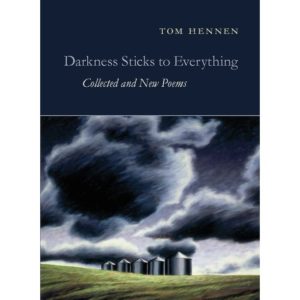
As a Midwestern poet, Tom Hennen is often paired in people’s minds with Ted Kooser. That is, if Hennen is in your mind in the first place. For me, he wasn’t because I’d never heard of him, and while his poetry is, like Kooser’s, plain-spoken, it is also so nature-centric that I cannot in good faith consider these two that similar. Related by geography and style at times, but different, too.
First and foremost, if you crave rapidly-disappearing nature as a topic in your poetry, Hennen is your man. By modern standards where identity serves as the new Garden of Poetic Eden, he is quaint with his love of the four seasons (especially autumn), trees (especially pines), earth (especially its sky) and so much more. This collection, encompassing some of his best work along with some new poesies, includes the early image poems, focused with great specificity on the landscape, as well as his wonderful collection of prose poems covering the same matter, called “Crawling Out the Window.”
If you are looking for comparisons, Hennen’s quiet army of fans are more than willing to provide them. The Ancient Chinese poets. Robert Bly. James Wright. Francis Ponge. The Scandinavian poets Olav H. Hauge, Harry Martinson, and Rolf Jacobsen. Imagery, personification, and folksiness work together to bring big surprises in small packages. As you read Hennen, his poems grow on you like moss on a tree. Slowly.
So let’s look and see, shall we?
Spring Follows Winter Once More
Lying here in the tall grass
Where it’s so soft
Is this what it is to go home?
Into the earth
Of worms and black smells
With a larch tree gathering sunlight
In the spring afternoon
And the gates of Paradise open just enough
To let out
A flock of geese.
Finding Horse Skulls on a Day That Smelled of Flowers
At the place where I found the two white skulls
Sunlight came through the aspen branches.
Under one skull were
Large beetles with hard bodies.
The other one
I didn’t move.
Around them new grass grew
Making the scent of the earth visible.
Where the sun touched shining bone
It was warm
As though the horses were dreaming
In the spring afternoon
With night
Still miles away.
Things Are Light and Transparent
During the fall, objects come apart when you look at them.
Farm buildings are mistaken for smoke among the trees.
Stones and grass lift just enough off the ground so that you can
see daylight under them. People you know become transparent
and can no longer hide anything from you. The pond the
color of the rainy sky comes up to both sides of the gravel road
looking shiny as airplane wings. From it comes the surprised
cry the heron makes each time it finds itself floating upward
into a heaven of air, pulled by the attraction of an undiscovered
planet.
The Life of a Day
Like people or dogs, each day is unique and has its own personality
quirks, which can easily be seen if you look closely.
But there are so few days as compared to people, not to mention
dogs, that it would be surprising if a day were not a hundred
times more interesting than most people. Usually they
just pass, mostly unnoticed, unless they are wildly nice, such
as autumn ones full of red maple trees and hazy sunlight, or
if they are grimly awful ones in a winter blizzard that kills the
lost traveler and bunches of cattle. For some reason we want
to see days pass, even though most of us claim we don’t care to
reach our last one for a long time. We examine each day before
us with barely a glance and say, no, this isn’t one I’ve been looking
for, and wait in a bored sort of way for the next, when, we
are convinced, our lives will start for real. Meanwhile, this day
is going by perfectly well adjusted, as some days are, with the
right amounts of sunlight and shade, and a light breeze perfumed
from the mixture of fallen apples, corn stubble, dry oak
leaves, and the faint odor of last night’s meandering skunk.
Like I said, nothing fancy here. Country wisdom by a man who can name things and who sees movement and life in ways that we don’t and in things that we don’t. Like a warm breeze in early spring, it is. If you’re a certain kind of “old soul” reader, that is.
